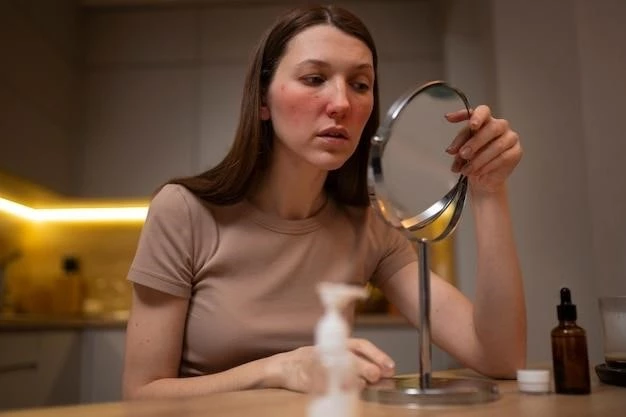Understanding Acne Vulgaris and Its Management
I․ Introduction to Acne Vulgaris
Acne vulgaris is a common skin condition characterized by the presence of pimples, blackheads, and cysts․ It primarily affects adolescents but can persist into adulthood․ The condition arises from a combination of factors such as excess oil production, clogged pores, bacteria, and inflammation․
Understanding the different types of acne lesions is essential for effective management․ These include comedones (blackheads and whiteheads), papules, pustules, nodules, and cysts․ Each type requires a specific approach in treatment to prevent scarring and achieve clear skin․
While acne vulgaris is not a life-threatening condition, it can significantly impact self-esteem and quality of life․ Proper management strategies involving a combination of lifestyle modifications, skincare routines, and medical interventions can help individuals combat acne and regain confidence in their skin․
II․ Causes of Acne Vulgaris
Acne vulgaris is a multifactorial skin condition influenced by various factors․ The primary cause is the overproduction of sebum by sebaceous glands, leading to clogged pores․ Additionally, the presence of the bacteria Propionibacterium acnes plays a role in triggering inflammation․
Hormonal fluctuations, especially during puberty, can exacerbate acne by increasing oil production․ Genetics also contribute to acne susceptibility, with a family history of acne increasing the likelihood of developing the condition․ Environmental factors like pollution and certain medications can worsen acne․
Poor skincare habits, such as using harsh products or not cleansing properly, can aggravate acne․ Diet plays a controversial role, with some studies suggesting a link between high glycemic index foods and dairy products with acne development․ Psychological stress is known to worsen acne through hormonal changes․
Understanding these diverse causes of acne vulgaris is crucial for tailoring effective treatment plans․ Addressing each contributing factor can help manage acne and prevent future breakouts, ultimately improving skin health and overall well-being․

III․ Effective Treatments for Acne
When addressing acne, there are several effective treatment options available to manage this common skin condition․ Topical treatments like benzoyl peroxide, retinoids, and salicylic acid work to unclog pores, reduce inflammation, and prevent new acne lesions․
Oral medications such as antibiotics, combined oral contraceptives, and isotretinoin can be prescribed for moderate to severe acne cases․ These medications target bacteria, hormonal factors, and oil production to improve skin clarity and prevent scarring․
Procedures such as chemical peels, microdermabrasion, and light therapy can help reduce acne lesions, improve skin texture, and minimize acne scars․ Laser therapy is another option for targeting acne-causing bacteria and reducing inflammation․
In addition to medical interventions, lifestyle modifications like maintaining a consistent skincare routine, avoiding triggers like greasy cosmetics, and managing stress can complement treatment effectiveness․ Consulting a dermatologist for personalized treatment recommendations is essential for achieving optimal results in acne management․
IV․ Acne and Hormonal Imbalance
Hormonal imbalance plays a significant role in the development of acne, especially during puberty when fluctuations in androgen levels stimulate sebaceous gland activity․ Increased sebum production can lead to clogged pores and acne lesions․
In women, hormonal changes during the menstrual cycle, pregnancy, or menopause can trigger acne flare-ups․ Conditions like polycystic ovary syndrome (PCOS) are associated with hormonal imbalances that contribute to persistent acne․
Treating hormonal acne may involve oral contraceptives, anti-androgen medications, or hormonal therapies to regulate hormone levels and reduce sebum production․ These treatments aim to address the root cause of acne associated with hormonal imbalance․
Understanding the relationship between hormones and acne is crucial for developing targeted treatment plans that address the underlying hormonal factors contributing to breakouts․ Dermatologists can provide tailored recommendations based on individual hormonal profiles and acne severity․
V․ Dietary Factors Influencing Acne
The link between diet and acne is a topic of ongoing research and debate․ Some studies suggest that high glycemic index foods, such as sugary snacks and processed carbohydrates, may exacerbate acne by increasing insulin levels and inflammation․
Dairy products, particularly skim milk, have also been associated with acne development in some individuals due to their hormone content and potential to trigger inflammatory responses in the body․ Certain fatty foods and chocolate are other dietary factors that some believe might worsen acne․
Conversely, research indicates that consuming a diet rich in fruits, vegetables, whole grains, and lean proteins may help reduce acne severity․ Antioxidant-rich foods like berries and green tea can have anti-inflammatory effects on the skin, potentially benefiting acne-prone individuals․
While the correlation between diet and acne is not yet fully understood, maintaining a balanced diet and monitoring how certain foods impact skin health can be beneficial․ Consulting with a healthcare provider or dermatologist can help individuals determine if modifying their diet could contribute to better acne management․
VI․ Managing Acne Scars
Acne scars are a common aftermath of severe or untreated acne lesions, affecting both the skin’s appearance and the individual’s self-esteem․ Overcoming acne scars involves various treatment options that can help improve skin texture and reduce their visibility․
Dermatological procedures like chemical peels, microdermabrasion, laser therapy, and microneedling can target different types of acne scars by promoting skin resurfacing, collagen production, and scar remodeling․ These treatments can result in smoother, more even skin․
Topical treatments containing ingredients like retinoids, vitamin C, and hyaluronic acid can also aid in diminishing acne scars by promoting cell turnover, boosting collagen synthesis, and enhancing skin hydration and elasticity․
It’s essential to consult with a dermatologist to determine the most suitable acne scar treatment based on the type and severity of scars․ Combining different modalities or using a combination of at-home and in-office treatments may be recommended for optimal results in managing acne scars and improving skin confidence․
VII․ Psychological Impact of Acne
The psychological impact of acne goes beyond physical symptoms, affecting emotional well-being and self-confidence․ Acne can lead to feelings of self-consciousness, low self-esteem, anxiety, and even depression, particularly in severe cases or when scarring is present․
Social interactions, relationships, and daily activities may be influenced by the stigma associated with acne․ Negative perceptions of one’s appearance due to acne can impact mental health and quality of life, highlighting the importance of addressing the psychological aspects of acne․
Support from healthcare professionals, therapists, or support groups can offer emotional assistance to individuals struggling with the psychological effects of acne․ Encouraging self-compassion, practicing stress management techniques, and developing a positive self-image are crucial in coping with acne-related emotional challenges․
Effective acne treatment, alongside psychological support, plays a vital role in improving emotional well-being and quality of life for individuals dealing with acne․ By addressing both the physical and psychological aspects of acne, individuals can cultivate a positive self-image and navigate their acne journey with resilience and confidence․
VIII․ Skincare Tips for Acne-Prone Skin
Proper skincare is essential for managing acne-prone skin and preventing breakouts․ Cleansing the skin gently twice daily with a mild, non-comedogenic cleanser helps remove oil, dirt, and impurities without stripping the skin of its natural oils․
Using a toner containing salicylic acid or witch hazel can help unclog pores and reduce excess oil production․ Incorporating a lightweight, oil-free moisturizer with ingredients like hyaluronic acid can hydrate the skin without clogging pores․
Avoiding harsh scrubs, abrasive exfoliants, and picking at acne lesions is crucial to prevent further irritation and inflammation․ Sun protection is essential, so opt for a non-comedogenic, broad-spectrum sunscreen to protect the skin from harmful UV rays․
Choosing makeup labeled as non-comedogenic and oil-free can help prevent pore blockage․ Keeping hair clean and away from the face, washing pillowcases regularly, and avoiding touching the face can also minimize acne flare-ups․
Consistency is key when it comes to skincare routines for acne-prone skin․ Consulting with a dermatologist can help determine the most suitable products and treatments for individual skin needs and ensure a comprehensive approach to managing acne and promoting skin health․
IX․ Latest Research on Acne Treatment
Ongoing research in the field of acne treatment focuses on innovative approaches to address the underlying causes of acne vulgaris and improve therapeutic outcomes․ One area of interest is the development of topical therapies that target specific pathways involved in acne pathogenesis․
Nanotechnology is being explored to enhance drug delivery systems for acne medications, allowing for better penetration and efficacy․ The use of probiotics and prebiotics to modulate the skin microbiome shows promise in managing acne by restoring microbial balance and reducing inflammation․
Advancements in laser and light therapies offer non-invasive options for treating acne, targeting sebaceous glands, bacteria, and inflammation․ Combination treatments utilizing multiple modalities are being studied to optimize results and minimize side effects․
Research into personalized medicine approaches aims to tailor acne treatments based on individual factors such as skin type, genetic predispositions, and hormonal profiles․ This personalized approach may lead to more effective and efficient acne management strategies․
By staying abreast of the latest research findings, healthcare providers and dermatologists can offer patients cutting-edge treatments that address acne comprehensively․ Continued exploration and innovation in acne treatment modalities hold promise for enhancing patient outcomes and advancing the field of dermatology․
